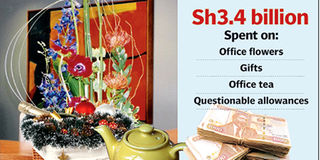State spends billions on flowers and tea

What you need to know:
- Some ministries use almost 25 per cent of allocation on hospitality
A government facing a huge budget deficit is spending Sh3.4 billion on items such as flowers, gifts, office tea and questionable meal allowances.
Some ministries are spending as much as 24 per cent of their recurrent budget on what is described as “hospitality supplies” and reimbursement of personal allowances.
Inquiries by the Daily Nation at the Immigration ministry revealed that hospitality supplies budget covers purchase of office flowers, gifts, tea and other catering services.
Meal allowance
According to the Office of the Ombudsman, a lot of money is also going towards meal allowances, an entitlement that has been grossly abused by public servants.
Letters by Mr Ken Mwige, the executive director of the Public Complaints Standing Committee (Ombudsman), to permanent secretaries questioning payment of meal allowances show that government regulations stipulate that the allowance is only payable to officers travelling away on duty, but who do not spend a night outside their work stations.
The Daily Nation has seen documents which show that public servants have been routinely claiming the money every month — whether or not they travel out of their offices.
The whole system is open to abuse because payments are hard to audit due to the fact that claims are generated and processed by the very officers who benefit from the allowances.
According to regulations, public servants working during weekends or lunch hour or after 5pm are entitled to such allowances. But the regulations also stipulate that extra office hours must not exceed 10 days in a month.
Guidelines issued by Head of Public Service Francis Muthaura say that officers working over lunch hour and evenings should be supplied with meals instead of being paid allowances.
An accounting officer who spoke to the Nation on condition that his name was not revealed because it would jeopardise his work, said he was aware of cases where senior civil servants were taking home an extra Sh100,000 a month in “meal allowances”.
Ministry of Justice permanent secretary Amina Mohamed last year warned that payment of meal allowance had “become unsustainable and subject to abuse”.
“This has been brought about by the misguided belief by most officers that payment of this allowance is their right and an additional source of income,” she wrote in a letter dated October 21, last year, addressed to all heads of department in the ministry.
Of the Sh197 million set aside for the Energy ministry, it has earmarked Sh48.3 million for buying flowers, gifts, office tea and meal allowances. The Ministry for Immigration will spend Sh47.5 million for hospitality this year.
But Mr Kennedy Buhere, a public relations officer at the ministry, denied that public servants have been receiving meal allowances whether they travel or not.
“I have not seen that kind of thing here. Officers have to travel out of station to get the allowances.”
The ministry was allocated Sh13.2 million for staff allowances.
The Education ministry devoted Sh323.2 million to hospitality and allowances, while State House will pay Sh79.6 million.
The Ombudsman’s objections to the irregular payment, particularly of meal allowances, have met resistance from the civil servants, who find the system a cash cow.
Budget deficit
Other big spenders on hospitality supplies and personal allowances, according to the estimates, include the ministries of Finance (Sh293.6 million), Foreign Affairs (Sh290 million), Medical Services (Sh215 million) and Lands Sh147.2 million).
The Ministry of Finance’s recurrent expenditure is Sh22 billion, Foreign Affairs (Sh6.3 billion), Lands (Sh1.4 billion) and Medical Services Sh23.2 billion.
The government recently announced austerity measures as part of the effort to bridge a huge budget deficit. Recruitment of new staff has been frozen and some development projects put on hold.
It has also slashed spending on domestic and international travel, conferences, training and furniture. This was in the face of government departments asking Treasury to provide more than Sh100 billion for them to meet their needs.
Media reports
“We are doing this as part of our efforts to rationalise expenditure to ensure only priority projects and activities are implemented,” Finance minister Uhuru Kenyatta told journalists last week in response to media reports that the government had run out of funds.
Earlier, his permanent secretary Joseph Kinyua told a donors’ conference in Nairobi that the government was in dire need of Sh70 billion to seal the deficit.
Prime Minister Raila Odinga is on record as having indicated that the country’s foreign exchange earnings are on a decline.
“This development has forced us to draw down our official foreign exchange reserves to a low of 2.8 months of import cover,” Mr Odinga said.
The PM’s office will use Sh127.1 million on hospitality and staff reimbursement, 12.7 per cent of its total recurrent expenditure.
Prof Helen Sambili’s Youth Affairs and Sports ministry has devoted Sh132.5 million to allowances and hospitality.
Mr Mwige’s protest letters to ministry officials point out that the payments were not justifiable. In one of them, he warns that workers have been flouting the rule on meal allowances.
Kitty misused
On Sunday, Public Accounts Committee chairman Bonny Khalwale admitted that the kitty had been misused.
He asked the Kenya Anti-Corruption Commission to move in and investigate the matter.
According to Mr Mwalimu Mati, the executive director of Mars Group, the payments illustrate abuse of public trust in government where tax money is spent on the personal comfort of public officers even as millions of Kenyans face starvation.
He said wasteful spending was worsened by the decision by the President and Prime Minister to have a bloated Cabinet of 42 ministers.




